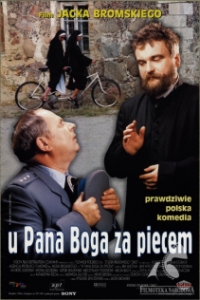IN HEAVEN AS IT IS ON EARTH [1998]

year:
- 1998
release date:
- 13 XI 1998
runtime:
- 100 min
directed by:
- Jacek Bromski
written by:
- Zofia Miller [pen name of Tadeusz Chmielewski]
director of photography:
- Ryszard Lenczewski
cast:
- Ira Łaczina [Marusia], Jan Wieczorkowski [Witek Naliwajko], Krzysztof Dzierma [Father Antoni], Andrzej Zaborski [Henryk, police commandant], Anna Janowska [Tania], Artur Krajewski [Sławek Rudy], Alicja Bach [Ratajowa], Iwona Szczęsna [Jola, Rudy’s wife], Eliza Krasicka [Jadzia, Chief’s wife], Małgorzata Płońska [Mayor’s wife], Mieczysław Fiodorow [Mieczysław, Mayor], Sylwia Janowicz-Dobrowolska [Mayor’s daughter], Ewa Sierzputowska [Hanka, Mayor’s daughter], Ryszard Doliński [Śliwiak]
edited by:
- Jadwiga Zajiček
music by:
- Henri Seroka
production design:
- Dorota Ignaczak
produced by:
- Telewizja Polska – Telewizyjna Agencja Produkcji Teatralnej i Filmowej, Studio Filmowe „Oko”
producer:
- Tadeusz Chmielewski
awards:
-
• Polish Film Festival in America, Chicago, 1998: Golden Teeth
• Polish Feature Film Festival Gdynia 1998: awards for best director, for best screenplay, best performance in a supporting role for Andrzej Zaborowski, best sound for Katarzyna Dzida, Golden Clapper - Radio Gdańsk award for the most applauded film, award of the Mayor of Gdynia for the best comedy, Video Studio Gdańsk award for Ira Łaczina
• Lubusz Film Summer Łagów 1989: Bronze Grape
• Comedy Festival Lubomierz 1999: Brown Granade
• Film Review Prowincjonalia Słupca 1999: Gold Johnnie, Journalists’ Award
• Tarnów Film Award 1999: Special Award, Silver Leliwita Statuette
• Comedy Festival Lubomierz 2006: Silver Sickle
About the film
The warm, idealised image of provincial life owes its charm to the brilliant script written (under the pseudonym of Zofia Miller) by the author of classic Polish comedies, Tadeusz Chmielewski. The characters are likeable due to their straightforwardness and unpretentious nature. Its success can be largely attributed to the actors of the Białystok Puppet Theatre.
Marusia, a young Russian woman, crosses the eastern border on a bus. The bus is attacked by a Georgian gang demanding a payoff from the Russians. They rob Marusia of all her money, so she decides to notify the local police. As a key witness, she is detained in the town by the Commissioner; on the advice of the parish priest, she is placed in the home of Witek − a young organist. It turns out that Marusia, with whom Witek falls in love at first sight, has a beautiful voice. The priest suggests that the girl might stay longer and sing Ave Maria at the wedding of the daughter of the Mayor. The girl likes life in the town, its calm rhythm and kind people. She feels something for Witek. After a lot of effort, the Commissioner takes the robbed money from the Georgians and drives them out of the town. When Marusia gets her money back and is about leave, the shy Witek proposes to her by playing Mendelssohn's Wedding March.
Jan Słodowski, Leksykon polskich filmów fabularnych, Warszawa 1996



